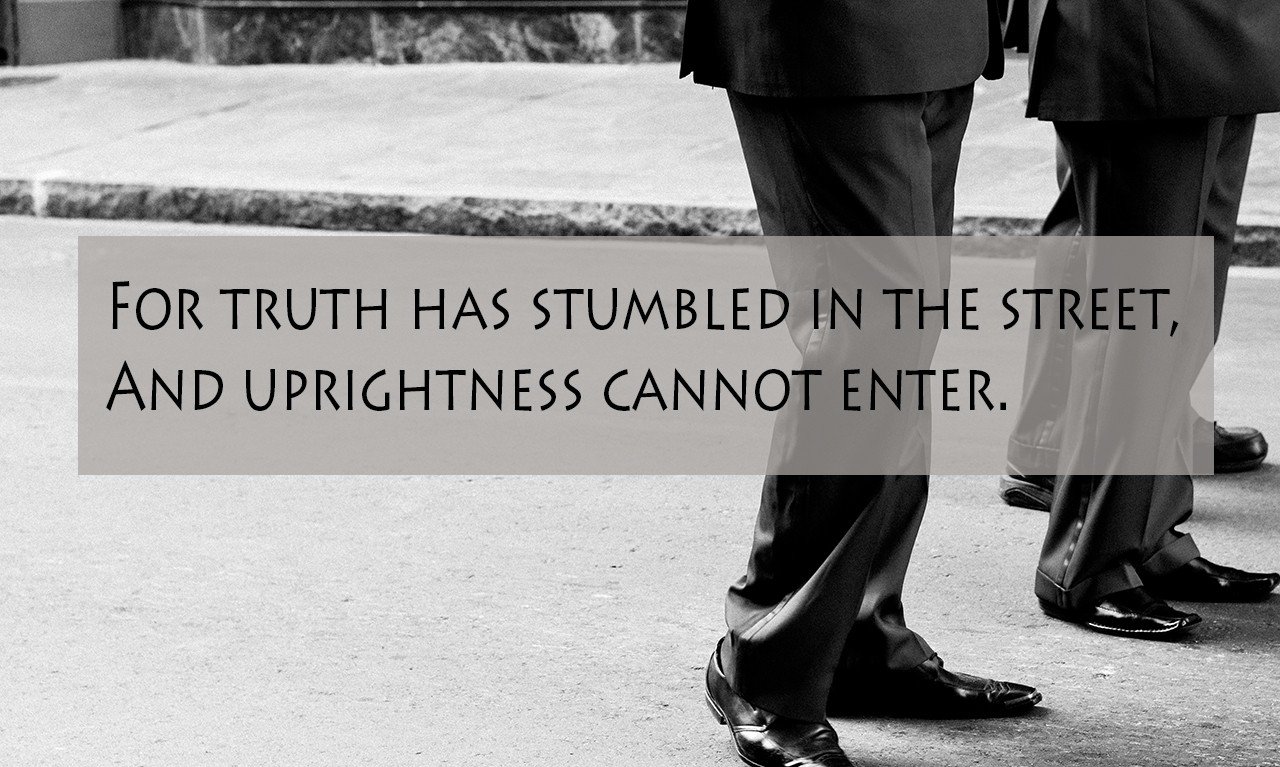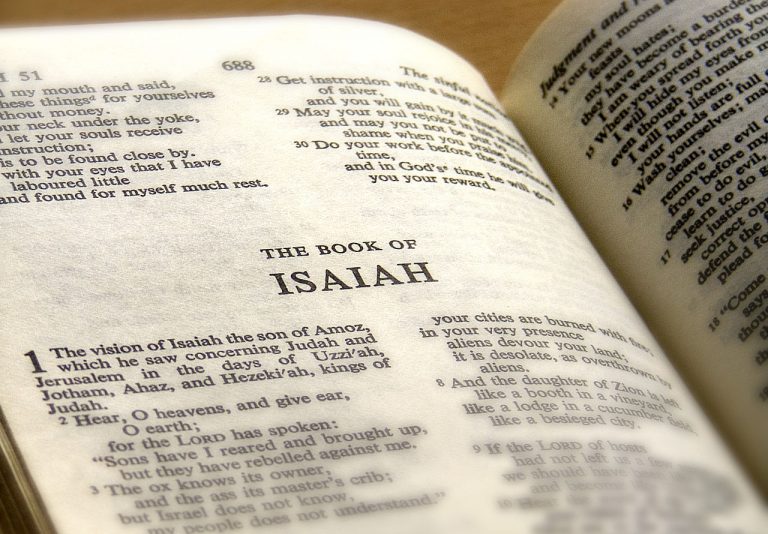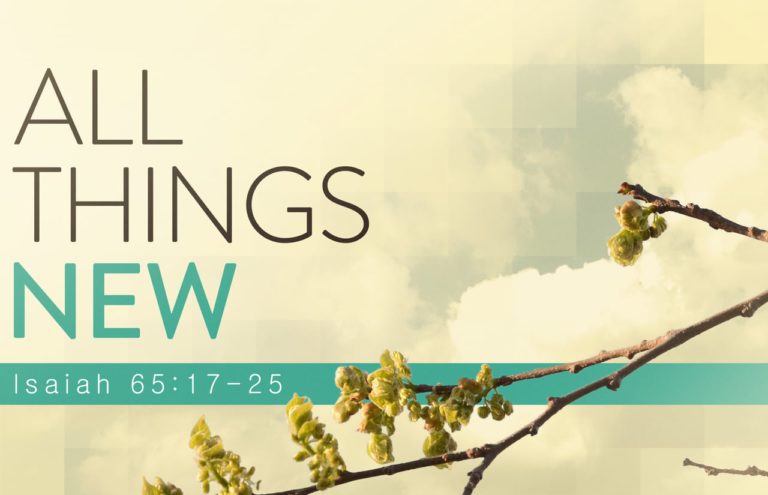Evil and Oppression
59 Behold, the LORD’s hand is not shortened, that it cannot save,
or his ear dull, that it cannot hear;
but your iniquities have made a separation
between you and your God,
and your sins have hidden his face from you
so that he does not hear.
For your hands are defiled with blood
and your fingers with iniquity;
your lips have spoken lies;
your tongue mutters wickedness.
No one enters suit justly;
no one goes to law honestly;
they rely on empty pleas, they speak lies,
they conceive mischief and give birth to iniquity.
They hatch adders’ eggs;
they weave the spider’s web;
he who eats their eggs dies,
and from one that is crushed a viper is hatched.
Their webs will not serve as clothing;
men will not cover themselves with what they make.
Their works are works of iniquity,
and deeds of violence are in their hands.
Their feet run to evil,
and they are swift to shed innocent blood;
their thoughts are thoughts of iniquity;
desolation and destruction are in their highways.
The way of peace they do not know,
and there is no justice in their paths;
they have made their roads crooked;
no one who treads on them knows peace.
Therefore justice is far from us,
and righteousness does not overtake us;
we hope for light, and behold, darkness,
and for brightness, but we walk in gloom.
We grope for the wall like the blind;
we grope like those who have no eyes;
we stumble at noon as in the twilight,
among those in full vigor we are like dead men.
We all growl like bears;
we moan and moan like doves;
we hope for justice, but there is none;
for salvation, but it is far from us.
For our transgressions are multiplied before you,
and our sins testify against us;
for our transgressions are with us,
and we know our iniquities:
transgressing, and denying the LORD,
and turning back from following our God,
speaking oppression and revolt,
conceiving and uttering from the heart lying words.
Judgment and Redemption
Justice is turned back,
and righteousness stands far away;
for truth has stumbled in the public squares,
and uprightness cannot enter.
Truth is lacking,
and he who departs from evil makes himself a prey.
The LORD saw it, and it displeased him
that there was no justice.
He saw that there was no man,
and wondered that there was no one to intercede;
then his own arm brought him salvation,
and his righteousness upheld him.
He put on righteousness as a breastplate,
and a helmet of salvation on his head;
he put on garments of vengeance for clothing,
and wrapped himself in zeal as a cloak.
According to their deeds, so will he repay,
wrath to his adversaries, repayment to his enemies;
to the coastlands he will render repayment.
So they shall fear the name of the LORD from the west,
and his glory from the rising of the sun;
for he will come like a rushing stream,
which the wind of the LORD drives.
“And a Redeemer will come to Zion,
to those in Jacob who turn from transgression,” declares the LORD.
“And as for me, this is my covenant with them,” says the LORD: “My Spirit that is upon you, and my words that I have put in your mouth, shall not depart out of your mouth, or out of the mouth of your offspring, or out of the mouth of your children’s offspring,” says the LORD, “from this time forth and forevermore.”
(ESV)
Isaiah 59 Commentary
by Brad Boyles
In a beautiful example of what it is like for the Lord to work in a person’s heart, Isaiah speaks directly to the blindness of Israel. In reality, it is the blindness that all of us have experienced. Early in Isaiah 6, before the introduction of Jesus (The Servant), Isaiah is told by God that his message will only contribute to the blindness of his people. There was no spiritual awakening without Christ.
“The people say, “Now we know why God does not save us from those who oppress us. We hope for light to walk by, but there is only darkness, [10] and we grope about like blind people. We stumble at noon, as if it were night, as if we were in the dark world of the dead.”
Isaiah 59:9-10 GNB
Earlier in the chapter, Isaiah stated that God is not powerless to save his people as some might suggest. This question gets asked so often in our modern culture, “How can God allow bad things to happen to good people.” The truth of the Bible is that those “bad things” were caused by sin which is why there aren’t any “good people” (outside of Christ, of course.) And who was it who sinned? It was us.
“In the past you were spiritually dead because of your disobedience and sins.”
Ephesians 2:1 GNB
“So then, if we do not do the good we know we should do, we are guilty of sin.”
James 4:17 GNB
It is sin that has always been the problem. Isaiah lands on the same conclusion here in Isaiah 59.
“LORD, our crimes against you are many. Our sins accuse us. We are well aware of them all. [13] We have rebelled against you, rejected you, and refused to follow you. We have oppressed others and turned away from you. Our thoughts are false; our words are lies.”
Isaiah 59:12-13 GNB
This is the collateral damage of sin. Going back to our sin is like the Israelites wanting to go back to Egypt after the Exodus!
As believers, when we are unrepentant and continue to habitually commit the same intentional sins, the face of God becomes dim. This was illustrated perfectly at the cross. While Jesus was taking the place of sinners and taking on the sin of the world, He cried out, “MY GOD, MY GOD, WHY HAVE YOU FORSAKEN ME?” The Father’s face was hidden as Jesus became sin.
However, the power to defeat sin is not found in willpower or knowledge. It is found in grace. You and I were destined to be separated from God for eternity and by His grace, He gave His Son in our place. The power of Christ’s love propels us to live in our new identity. We are no longer sinners! We are saved — and now, through the Holy Spirit, we can live like it!
Kinsman-Redeemer
The chapter ends with a look into the future role of Jesus Christ.
““The Redeemer will come to Zion, and to those in Jacob who turn from transgression.” This is the LORD’s declaration. [21] “As for me, this is my covenant with them,” says the LORD: “My Spirit who is on you, and my words that I have put in your mouth, will not depart from your mouth, or from the mouths of your children, or from the mouths of your children’s children, from now on and forever,” says the LORD.”
Isaiah 59:20-21 CSB
The Redeemer is sometimes translated as kinsman-redeemer. It’s a deeper topic so if you want to study it more, you can visit GotQuestions.org. Basically, the kinsman-redeemer could act on behalf of a family member who was in trouble or in need. For example, he could buy an Israelite out of slavery, be the “avenger of blood” for a murdered family member, or buy back land that had been taken from the family. In the case of Boaz, he filled the role of kinsman-redeemer in the book of Ruth by taking Ruth as his wife. This was yet another role of the kinsman-redeemer as outlined in Deuteronomy 25.
Christ is the fulfillment of this prophecy. He is our kinsman-redeemer. He has bought us from slavery. He is the only One who can bring justice to the wrongs done to us. The kinsman-redeemer restored what was lost. Jesus did the same.




